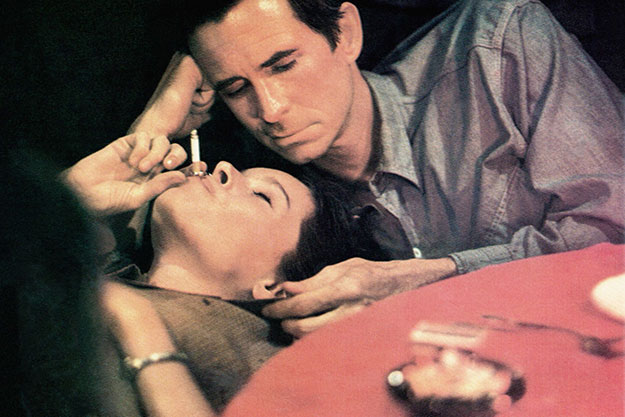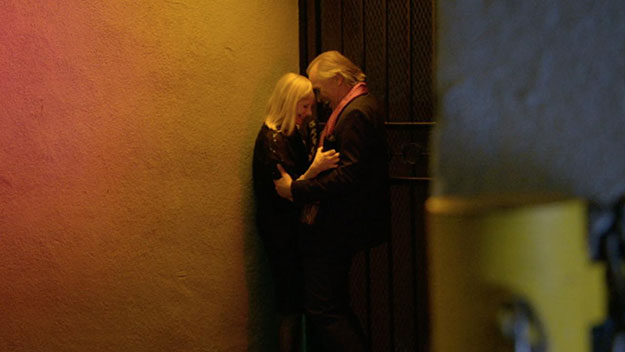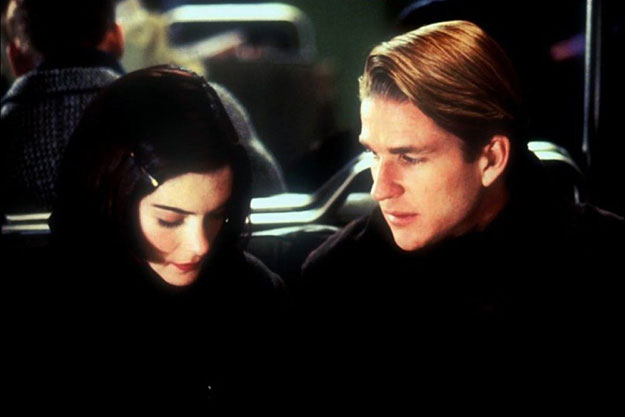Interview: Alan Rudolph
Speaking on the phone from his home in Washington State, director Alan Rudolph was friendly and talkative, even though he had to pack for his upcoming trip to promote his first movie in 15 years, Ray Meets Helen. Here in New York, the Quad Cinema is doing a retrospective of Rudolph’s work, including the three films that he assistant-directed for his mentor, Robert Altman. Rudolph touches on Altman in this interview, labeling him “kind of caustic and wicked and wonderful,” but goes into more detail about his primary influence—music—and his nights spent digging through albums at the now-defunct Tower Records. Coming across as somewhat reclusive, Rudolph is self-deprecating but proud of his work, influenced as much by William Cameron Menzies’s Invaders from Mars as by Miles Davis’s Kind of Blue. His films reflect all of this and more, rooted in unfettered emotion and steeped in style, running the gamut from small studio pictures to micro-budget contemporary fables, like Ray Meets Helen, which premieres Friday at the Quad, with Rudolph and actors Keith Carradine and Samantha Mathis in person for the evening show.

Remember My Name
I’m calling from New York, where the Quad is hosting a retrospective of your work. You’re scheduled to appear at a few of the screenings.
Yeah, that’s the plan. I’ll have my captors let me know what the schedule is. It’s pretty weird, like lifting a rock and having a crab see the sun for the first time. I’m just thrilled that they’re showing the movies. At least two-thirds of the prints are the only ones in existence. A film like Remember My Name [1978], which was so completely ignored when it first came out, was as limited as limited releases get. There’s no DVD, there’s no video, there’s nothing. I bought a print from the lab before it closed, I don’t know, 20 years ago, and I think that’s the only one around, so don’t tell anybody.
It’s amazing, because that film has become one of the most important in your filmography. Critics are really drawn to it.
At the time they were drawn to it with knives! I actually thought it was a giant leap ahead for me and I was thrilled with that little movie. I was so shaken by how it was received that I didn’t know what to do. There was nobody around who was interested in working with me, so I just tried it in the real world, and that didn’t work out so well.
Thankfully Geraldine Chaplin worked with you again.
Yeah well the actors were great. One thing about Remember My Name is the casting of Tony Perkins, who at the time was a real movie star. It’s funny, with Welcome to L.A. [1976], the guy I was most intimidated by was Denver Pyle, this Western actor, who probably influenced me more as a kid than anyone else—but on Remember Tony Perkins was a full-blown movie star, though slightly in decline in terms of his box office and whatnot, and I wanted to cast somebody who was exactly the opposite of what you would expect of a Los Angeles construction worker. That was his story—he came from New York, he was trying to be an architect, he ran away from that life and started over in an anonymous position. Geraldine shined through, she won an award at a film festival, but then the film just disappeared and the less that was said about it the better. I kept trying to tell everybody that whatever they thought of me, it was my best work, and I still think it is.
As for the music, I wanted some hard electric, instrumental blues. I started to edit it thinking I’ll just find some blues guitarist later and then Alberta Hunter started singing at the Cookery in New York. Once I heard her, I went back and re-edited the whole movie. The first thing that I did was eliminate at least a third of the dialogue and even entire scenes because she’s more articulate than I could ever be. Music to me is like the hub of the wheel. It’s visible, it works in your senses and emotions, and that seems to be where I reside. To me, music and emotional responses are twins, and if you want to establish emotional tone in a film then music is the number one way to do it.
I read one of your early interviews where you said that you were more influenced by John Coltrane than by John Ford.
Some glib asshole said that, I guess it was me. It’s true. I mean, look, I’m not going to deny John Ford, but for me personally that’s all I’ve ever been able to talk about when it comes to American filmmaking. I taught myself how to write screenplays just because the box I was in was too confining as an assistant director in the old Hollywood system. If you wanted to make a little film then you went to Roger Corman, I guess. I didn’t know where he was and I didn’t care. I just didn’t make those kinds of movies. So I started writing. I’d write a screenplay in three or four days just to learn how to do it. At the time you’d go to the Xerox machine with three dollars and you had a movie. But I always listened to music. This was before mobile technology, so when the first Walkman came out—I think it was the size of a Kleenex box—it changed my life forever. I started to tape pieces of music that I liked and I’d make little cassettes without putting labels on them. I used to prowl record stores after work every Friday night and I’d buy albums to tape them. I must have had a hundred tapes without knowing what was coming up next. It was a primitive version of shuffle. I’d walk around Manhattan and watch a movie unfold on the sidewalks listening to how it was scored in my head. But it’s funny, the number-one album was always Kind of Blue. Without that album, I’m not sure I would have been able to make films. Kind of Blue was my film school.

Ray Meets Helen
I was pleased to hear some muted trumpet on the soundtrack to Ray Meets Helen. It reminded me of some of the soundtracks you did with Mark Isham.
On Ray Meets Helen, I was always a Neanderthal when it came to being high-tech, but I figured out how to get into iTunes and buy some songs. It’s addictive—99 cents, how could that possibly add up?—and, I don’t know, one thing lead to another. There was this artist, Parov Stelar, and hidden inside of his albums were these moments that kind of reminded me of Mark, but then again Mark reminds me of Miles Davis, as anyone who plays a trumpet will. Somebody in the producer’s office found whoever owns the music, and the soundtrack is what came out of that. I’m really pleased with that music.
The story of meeting Mark is as coincidental as any one of my films. When Trouble in Mind [1985] came around, I said I needed to have the music first, before we even scouted for locations, so I decided to go to Tower Records and I looked through all of the albums until my hands were black. I was looking for someone who plays all the instruments, because I figured that would be affordable. I was hoping to get a trumpet or a sax lead, but I would take anything that sounded good. When I got to Mark’s records, I saw that he played everything and his lead instrument was the trumpet so I bought all his tapes and I drove around listening to them for a couple of hours. I drove back to my producer’s office and I said that this is the guy. The phone rang and it was some agent representing a composer who had a few directors in mind he wanted to work with—and I was one of them. The composer was Mark Isham! A week later, I drove up to San Francisco and met Mark. We went to his house and in his dungeon basement he had all of these gigantic refrigerator-sized synthesizers that were brand-new at the time. He played trumpet and asked what I was looking for. I said, I want something with an emotional pull, but I don’t want it to be traditional in any way. We were only there for a day, but we went through a dozen ideas before the movie was shot. I’d say we wrote 80 percent of the score in that dungeon.
Probably the most important film music for me, and it was late in the game, had to do with Altman. His office called me to be an assistant director and I said I don’t want to do that anymore, but they said I had to come meet him. I did and of course it changed my life. My little film dreams were just specks and Altman’s were skyscrapers. Bob reinvented it all, and I was right there at the time. He was very imposing, with piercing eyes. There was some X-ray vision about him, he was so smart and sharp and immediate, kind of caustic and wicked and wonderful. Anyway, I decided to work for him after I saw McCabe & Mrs. Miller, because it was exactly what I was searching for on my own but didn’t know it. I’d never seen music and film and mood and tone and story and everything come together in a way that was complete. I know there have been other movies since, but I think he defined our musical perception of film.
And then you used a Leonard Cohen song, too, “There Ain’t No Cure for Love,” in Love at Large [1990].
Love at Large was my attempt to make a film for a popular audience. It was made for the only good studio—Orion—and it was put together in like a week. The only comment one of the studio people made was, “Can you put a murder in?” And I said, “No, this is a murder mystery without a murder.” That didn’t ring a bell for them, but that’s what it was intended to be. There’s no hiding that it was influenced by several noir comedies. It’s more like The Thin Man…
Love at Large and Equinox [1992] are two of your films that I recently discovered and really liked a lot.
I’m so happy to hear it because Equinox was a movie… scorn is too polite a word for what that poor film received. If Remember My Name is just now having some sort of revival, right below that in obscurity is Equinox. It was released in just a handful of theaters and then it was gone. As for the soundtrack, I went to Tower Records looking for vinyl records and I purposefully went to the most obscure bins I could find and pulled out a bunch of music. I played it for David Blocker, who produced it, and he said, “Are you kidding? You’ve got music from Africa, Iran—that’s not in the script!” I said, “Well, you haven’t seen the movie yet. It’s a fable.” So I put this soundtrack together and David started calling everybody and making deals. I thought that was one of the more wonderful soundtracks I’ve ever had.

Equinox
Let’s talk about Ray Meets Helen.
I love it. I couldn’t be more proud of it. I wrote Ray Meets Helen way back when. It’s based on a couple of newspaper articles that caught my attention: one about an armored-truck crash where the truck had gone off the freeway in a poor neighborhood and the other from up here near Seattle, about a woman who found another woman’s identity and decided to become her. I didn’t want to make a movie about either of those specifically, but they just kind of tangled with each other, so I wrote the screenplay but left the ages of the main characters unknown. If I had made it at the time, it probably would have starred two people in their thirties, but it didn’t happen and for one reason or another, and almost 15 years later there was an opportunity to get it made. Keith [Carradine] had read it, and it suddenly made sense to me that it was about two people who were a little older. Sondra Locke is known for all those movies she did with Eastwood—which didn’t end well—and I thought, well, [casting her] is like discovering someone of a certain age.
One of the points of the film is that we live in total madness. I don’t even have to stress that anymore. Our daily lives are just insanity and our whole society is built upon this conformity, that we’re all the same and yet one thing that I’ve noticed—and Altman and I used to talk about this all of the time—is what every American has in common is that we’re all eccentric. And so one of the conceits of the film is someone who confronts everyday life as if they weren’t prepared for it, as if they’d never seen it, something as simple as having a nice steak at a restaurant is brand new to her. I wanted to make a film about how souls entwine, how surfaces attract, and yet there’s something underneath that really attracts them, that keeps them together.
The editor had never been on a film set before, but he had the equipment, and that’s all you need! It was the purest experience I could ever have making a film, and that was exactly what I was after. The film had its bumps and bruises as a result and the scope of it is limited, so I know what’s going to happen: people are going to say, “You know I’m so glad they’re showing all of these movies that no one really cared about over the last 40 years and now we all see that they’re pretty good—except for the new one. We like the old ones.” Ray Meets Helen is a modest movie by many standards, but I’m hoping that it has some resonance.
I sense some excitement around it. You’ve definitely got fans in New York.
That’s good. I think if anyone shows up to any of these screenings, probably most of them have never seen any of my films—and I don’t know if that’s good or bad. I’ve learned from the beginning that I don’t have the commercial key. Especially after Remember My Name, I could tell that my films are really made for individuals. That way there’s no word to spread, you know? It’s been a pretty lonely existence, but that’s all right. The power of making a film is that it’s here forever. But when watching Welcome to L.A., which has a pretty good transfer, seeing just how young everybody was, and just how young I was—not to be maudlin or reminiscent—it struck me as the mystery and magic of film. It’s just astounding, it’s the great dream. Hollywood has spent probably well over a trillion dollars devising how to murder and disfigure people and blow things up, but they don’t spend any money on enlightenment or the eternal pursuit of the human comedy. It’s kind of startling to me.
Yesterday I had to write a list of films that influenced me. I don’t think in terms of lists, but it was my homework assignment and I wrote in my little intro that if it’s for sheer impact, Invaders from Mars in 1953 when I was 9 years old probably had more influence on my life view than any other piece of film that I’ve ever seen. How do you quantify that? How do you talk about it? Whatever, I’m just glad that my films get to be seen over the next week or so. Maybe people will get to see things they haven’t seen before or maybe it will make them appreciate another film—not even a film of mine, but just a film.
Margaret Barton-Fumo is the editor of Paul Verhoeven: Interviews (University Press of Mississippi) and a longtime contributor to Film Comment.







